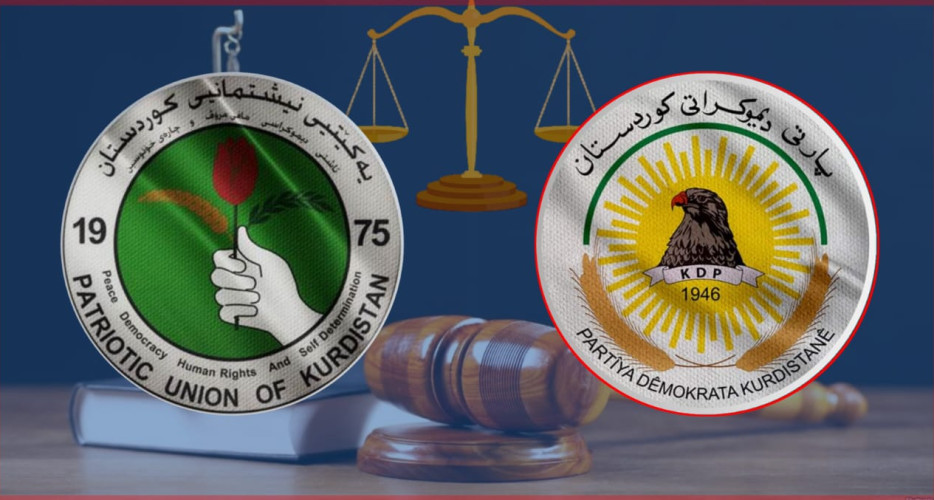
PEREGRAF
The political parties in the Kurdistan Region are politicizing the judiciary and undermining rule of law. Both the Kurdistan Democratic Party (KDP) and the Patriotic Union of Kurdistan (PUK) are failing to implement court orders and are sheltering defendants wanted in other jurisdictions. In some cases, the parties are using the wanted individuals for political and propaganda purposes in the media.
The latest example of a major political ruling occurred in June when a court in Erbil sentenced several PUK security commanders to death in connection with the assassination of PUK intelligence officer Hawkar Jaff in October 2022. Jaff was killed in a car bomb, which the Kurdistan Region’s Security Council blamed on members of the PUK’s Counterterrorism Group (CTG).
The PUK strongly denies any responsibility for Jaff’s death, which many observers believe was connected with internal conflicts within the party.
PUK officials, especially party leader Bafel Talabani, have openly rejected the Erbil court's decision. In fact, the party rewarded the case’s defendants and frequently feature them in its media, particularly CTG commander Wahab Halabjay.
One day after the court decision, Saadi Ahmad Pira, a member of the PUK's political bureau, said the judiciary in Erbil was a "political court" and that he was ashamed to talk about it.
A judge, who spoke on condition of anonymity, told Peregraf that “the main duty of the courts is to punish the criminals and issue decisions according to the law.”
“Court decisions must be implemented as they are. The decisions that are not implemented by the relevant police and security agencies are questionable," the judge added.
According to the Kurdistan Region’s Judiciary Law No. 23 of 2007, courts have jurisdiction over all natural and legal persons, including the government, and are responsible for resolving all disputes and crimes.
The Judicial Council is the highest judicial authority in the Kurdistan Region. It is chaired by the president of the Court of Appeals and its members include the deputy presidents of the Court of Appeals and the president of the Judicial Supervisory Board.
There are numerous examples of how the judiciary has been used for political purposes. Critically, the parties often use their influence to get loyalists appointed as judges, who then act according to partisan interest.
In May, the Judicial Council swore in two members of the Kurdistan Region’s electoral commission, despite a raging controversy over whether the Kurdistan Parliament had in fact voted to renew the commissions mandate. The KDP contended that parliament had held a vote, while the PUK was adamant that the speaker had called a recess.
In response to the decision to swear in the commission members regardless, the PUK described the Judicial Council as “biased.”
"The prosecutor general should monitor the implementation of the decisions in the court where the decision was issued or investigate the reasons for any decision that has not been implemented," Mohammed Rekani, a member of the Kurdistan Regional Government's (KRG) prosecutor general, told Peregraf.
While the parties continue to politicize the judiciary, their public statements hypocritically declare their support for the "sovereignty and independence" of the judiciary and the law.
“Every day, we see violations of the law by the officials of this Region, punishing their opponents and backing their criminal friends,” Sakar Sardar, a citizen of the Kurdistan Region, told Peregraf.
“This has caused citizens to lose confidence in the decisions of the courts and we see citizens who face problems turn to tribal reconciliation or revenge with their own hands,” he added.
The parties even have social bureaus that help people navigate tribal reconciliation, instead of advising them to use the civil justice system.
"The failure to implement the decisions of the courts will certainly weaken the role of the courts, violate the rule of law, and rights will not be protected. An important part of the rule of law is to implement the decisions as they are," said Rekani
“Any decision that is not implemented, the prosecutor general can request legal action from the executive branch and, if there is any negligence, they can file a complaint against the executive branch,” the prosecutor added.
The Judicial Council is the highest judicial authority in the Kurdistan Region and is constitutionally co-equal with the legislative and executive branches.
Karzan Fazel, a lawyer and director of the Center for the Development of Democracy and Human Rights, told Peregrafthat “the PUK and the KDP together have devalued the judiciary in the eyes of citizens. This process is continuing and is becoming worse.”
He added that the courts began to investigate cases of corruption more aggressively in 2018, which alarmed the KDP and the PUK. After that, they “turned the judiciary into [the image of] the parties and interfered to protect themselves.”
Many observers have pointed to the controversial prosecution of journalists and activists in Erbil as evidence of a political court.
Community Peacemaker Teams of Iraqi Kurdistan (CPT-IK), a rights group that routinely observes the trials of activists, released a statement following the recent conviction of journalist Sherwan Sherwani on new charges saying that it “is exceptionally concerned by interference in the KRG judiciary system.”
“This system has routinely been complicit in the KRG’s political-based punishment of journalists and activists. CPT-IK calls for press freedom and upon the KRG for the end of judicial interference,” it added.
Karwan Abdullah, a resident of the Kurdistan Region, told Peregraf that prosecution under “the law has always been only for the powerless and the poor.”
“The officials have devalued the courts and their decisions.”